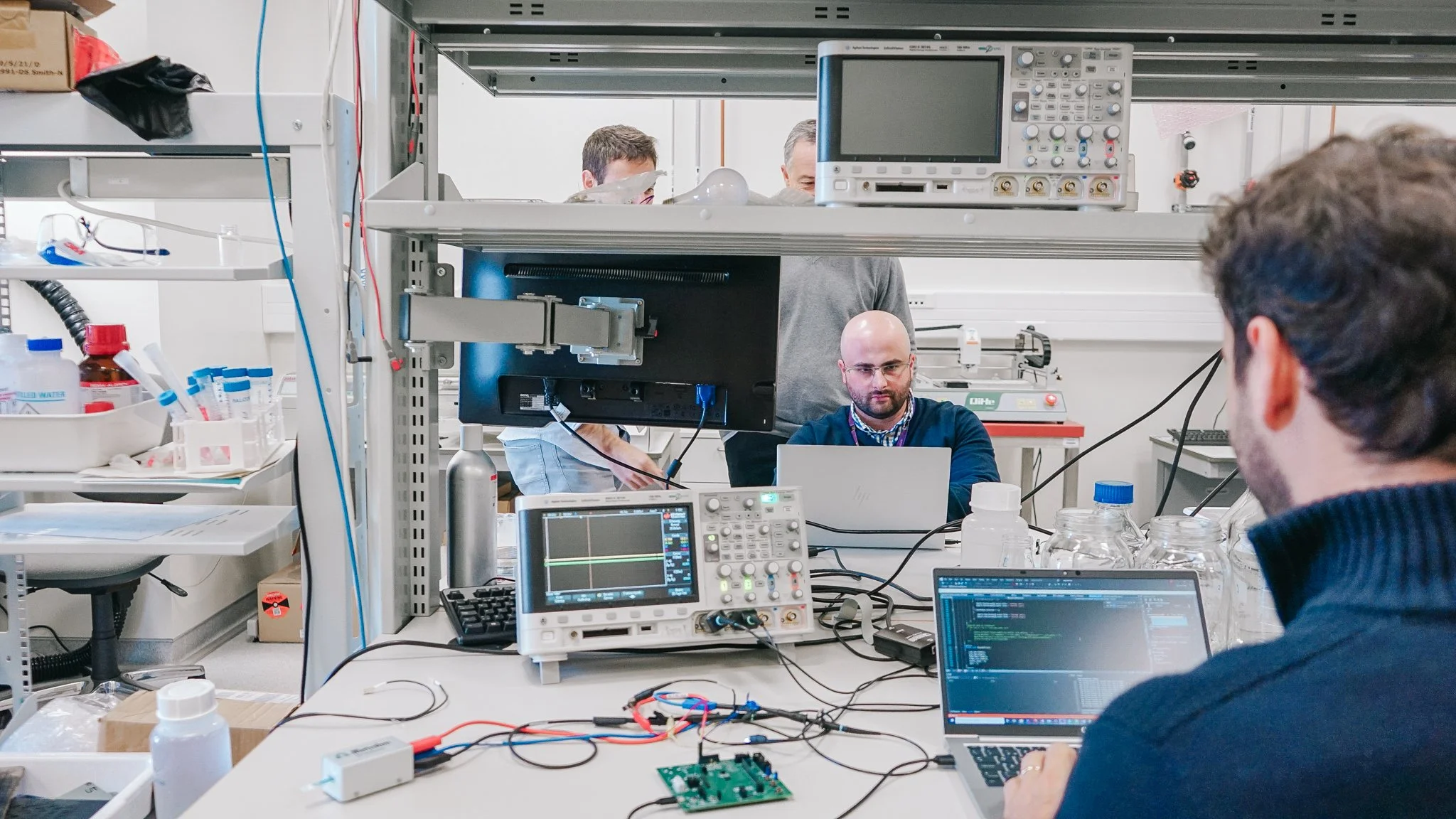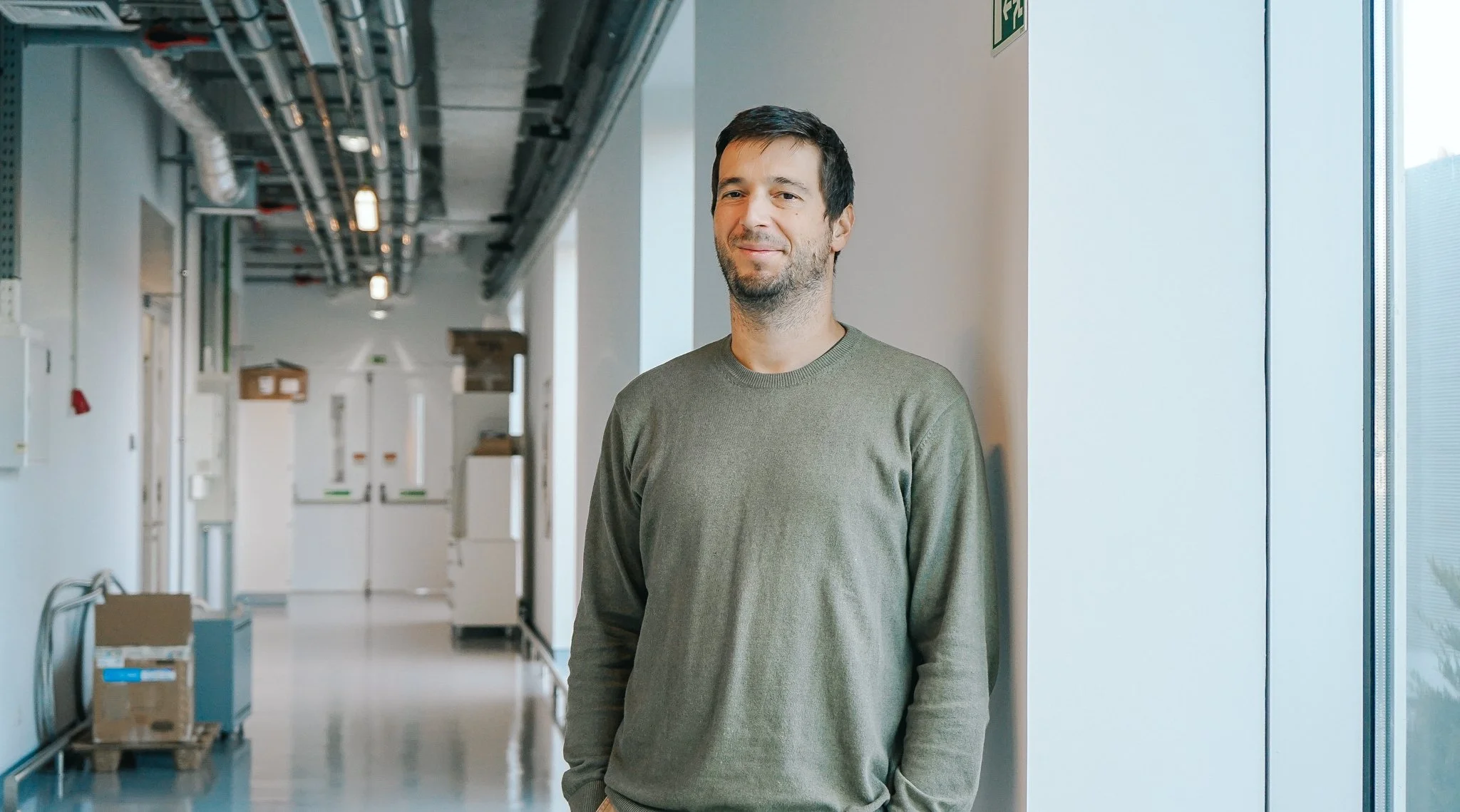Meet Carlos Marques, Research Engineer in the Systems Engineering Group
Meet Carlos Marques, Research Engineer of the Systems Engineering Research Group. Carlos holds an Industrial Electronics and Computer Engineering Integrated Master Degree and completed his PhD in Electronics and Computer Engineering in 2016 at the University of Minho.
His research and work are focused on almost all aspects of electronics, but his preferences are in analogue instrumentation, signal processing, power electronics, and everything that involves electromagnetism.
Could you take us through your professional life and the different roles you have played throughout your career?
I’m fond of electronics since I know myself. I remember disassembling old (sometimes even new) electronic and electromechanical equipment I had access to and becoming fascinated with all that coloured animated fuss, resembling big complex cities seem from the air, in which chaos and order coexist. From this perspective, it’s a pity nowadays electronic equipment is so small and hard to disassemble, it’s an entire underworld closing to kids’ eyes. Something similar is happening with homemade electronics, as the size of components continues to shrink, requiring specialized equipment for assembling them.
In all these years of activity, I have been in almost every branch of electronics: from analogue to digital; from small-signal to power applications; from low to high voltage; from low-frequency to high-frequency (radiofrequency); even on retro electronics (I’m a fan of electronic valves). I have also been active on microcontrollers and low-level programming (low-level software and firmware) for a long time; I started with the ZX Spectrum.
My “official” professional life started after getting my engineer’s degree, in a small research and development company in Braga. During that time I worked in close connection with the industry, designing custom retrofit devices and sometimes also making some industrial maintenance; I was a kind of “jack-of-all-trades”. It was a tough period of endless work and big responsibilities, having to deal with expensive industrial machines without having any specific training on some specific brand or model. I remember leaving work at 2am and dining a hot dog and a beer in some bar that was still open. I often worked overnight at home, for having things ready on time. The industry is the non-stop underworld that keeps society moving on, full of picaresque characters and sad lives, especially at night shifts. It was a very special period, it made me grow both as an engineer and as a person.
After that, I worked for one year as a freelancer, repairing and making custom electronic equipment for musicians (valve equipment, mostly), and doing some sporadic industrial maintenance, also. I’m an amateur musician, so this was a natural step. I was then invited to another small company, in which I designed power dimmers for all kinds of loads (that’s power electronics), and made some low-level software. I then decided to return to the university, for getting closer to the research world: I got a grant for working at a textile research centre, in which I designed medical-grade electronics for their textile applications.
I was becoming an experienced engineer. However, over all these years I noticed that the very best engineers (those who write technical books, for example) have a clear understanding of the underlying physics, more precisely, of electromagnetism. I retained some basic knowledge of it from the university classes, but soon I realised it was not enough for sure if I wanted to go further. At the time I was around 34, or 35 years old, so it seemed obvious to me that the best way for pursuing such knowledge was by taking a PhD. For that, I chose a subject that would force me to study electromagnetism hard: wireless power transmission. I made a proposal to the scientific committee of the university, and it was accepted, then I applied to the Portuguese FCT, and I got a PhD grant. That’s the “how and why” of my PhD. I know this isn’t the usual motivation for a PhD (you know, a research career in an academic context, writing a bunch of papers for the curriculum, etc.); I was more focused on the knowledge itself and on research methodology (learning how to think), just for being a better engineer. It ended up being a decisive option in my career, as it was a major step forward in my engineering skills, mainly in the understanding of fundamental phenomena, which is precisely the main limitation of the typical engineer, by the way.
Finally, having finished the PhD, and after a short hiatus, I applied to a position here at the INL in 2017, and here I am since then!
What aspects of systems engineering interest you the most?
As I said, I’m interested in almost all aspects of electronics, but my preferences would go for analogue instrumentation, signal processing, power electronics, and everything that involves electromagnetism. I like also the system-level approach to solving engineering problems, that is, devising an architectural solution (an algorithm or block diagram, for example).
ICs are the major enablers of current and future technologies and applications, such as 5G/6G, smart factories and cars, blockchains, artificial intelligence (AI), and machine learning. How do you see the future of IC design?
I would say that ICs will become smaller and more complex, integrating more and more things, thus continuing a long-lasting trend. Regarding the chip design itself, I believe there is still a lot to do on EDA - Electronic Design Automation software tools for analogue and radio frequency design automation, with special emphasis on automatic synthesis from a block diagram or analogue Hardware Description Language. Currently, EDA tools are quite advanced for digital electronics, but not so for the referred fields.
Still, I’m not the right person to comment on that, because I’m not a “full” chip designer, as I have just some knowledge of analogue CMOS design, and chip design is far more than that. In fact, my activity on chip design is practically limited to the system architecture.
We will see that technology continues to evolve rapidly with more electronic devices and appliances operating with a simple tap on a mobile app. Robotics and AI will also have a larger role in our world, making systems smarter, faster and more efficient.
Any advice for students considering a career in science or engineering?
First of all, be brave! Try to go further whenever possible, even if it takes more time: try to understand what you are doing, even if you are just copying or adapting an existing solution. Typically, engineers tend to know the “how”, but not the “why”: they love algorithms and formulas, but usually don’t know their origin or even their validity domain. This is the main limitation of most engineers, and it is the cause of the bad reputation they have in the research environment. But, to be fair, this works for both sides: usually, researchers don’t know what they are doing when they deal with engineering!
Try to be creative when you face a problem. Don’t start up by just looking immediately for an existing solution (a paper, an application note, a commercial solution, etc.), try to devise your own solution first, and then see how it compares to the existing ones if any. It takes time, as I said, but you will learn a lot in the process, and you will be boosting your creativity. Moreover, this is the key to bringing some added value to the institution you work for in the future, and thus becoming a valuable resource.
Last but not the least, try to broaden your personal interests and activities, don’t get stuck just on electronics. This will help with creativity, and you will become a more fulfilled (and interesting) person. Remember, life is finite and brief, carpe diem!




